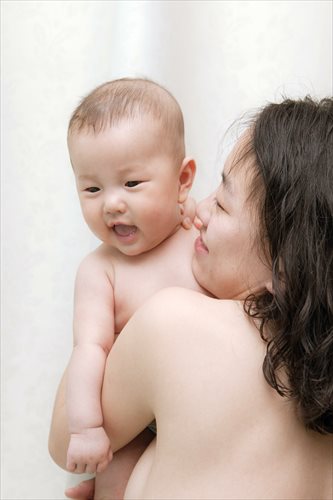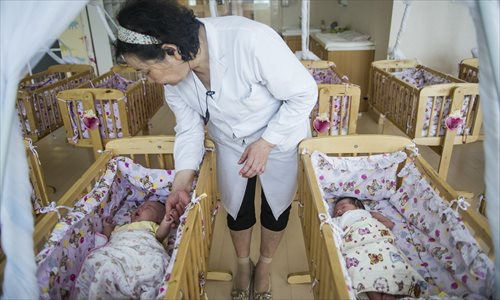HOME >> METRO BEIJING
Breaking the cycle
By Xie Wenting and Li Lin Source:Global Times Published: 2014-11-30 23:15:31

Antiretroviral therapy can reduce the risk of mother-to-child transmission of HIV from around 40 percent to less than 5 percent. Photo: Li Hao/GT
Unlike most mothers, when 22-year-old Sun Qiu heard the first whimpering mewl of her newborn child, her sense of joy was tempered by a gnawing anxiety.
Sun is HIV-positive. She contracted the disease from her own mother, one of the victims of the AIDS epidemic that ravaged China's rural counties in the 1990s due to unhygienic blood collection. Her home from an impoverished village in Henan Province, was one of areas worst-affected.
Sun's mother and father have since passed away as a result of the disease. Her husband, mother-in-law and father-in-law are all HIV positive.
To reduce the chances of her newborn son from befalling the same fate, Sun has throughout her pregnancy been taking an intensive course of antiretroviral medication to prevent mother-to-child transmission (PMTCT) of the disease.
The treatment is known to reduce the likelihood of mother-to-child transmission of HIV from between 25 and 40 percent to less than 5 percent.
"I had to take medication every day of my pregnancy," said Sun. "The results of all my antenatal examinations showed that the child was healthy."
Sun fetched her infant boy, who was tightly wrapped in a quilt.
"He's a bit skinny, but he looks healthy," says Sun again. "It's like a dream come true."
The truth behind the numbers
China introduced free PMTCT treatment for all HIV-positive pregnant women in 2003, and in 2010, nearly 74 percent of the 2,622 known HIV-positive pregnant women who gave birth in the country were treated with antiretroviral therapy, according to UNAIDS' 2012 China AIDS Response Progress Report.
This figure is marginally better than the 67 percent of around 240,000 HIV-positive pregnant women who received PMTCT treatment globally in 2013, according to a report World Health Organization (WHO) published this July.
But Zhang Bin, a doctor at Beijing Children's Hospital who has administered antiretroviral therapy to more than 100 HIV-positive pregnant women, said that the figures did not account for the swathes of pregnant women in China who had not registered as being HIV-positive, due to ignorance, isolation and fear of discrimination.
Zhang estimated that the actual proportion of HIV-positive pregnant women in China who received antiretroviral treatment to PMTCT was much lower.
"Most [HIV-positive pregnant women] are from isolated mountain areas and rural areas. Most lack even a basic understanding of AIDS, and live in difficult economic circumstances," said Zhang.
Because of the stigma that comes with having HIV/AIDS in China, said Zhang, many of these women give birth outside of the system, despite mandatory HIV screening policies for pregnant women in a number of provinces.

Although PMTCT therapy is free in China, many HIV-positive pregnant women forego treatment out of ignorance or fear of discrimination. Photo: Li Hao/GT
Widespread ignoranceSun said that public campaigns informing women about PMTCT did not reach her village.
She gave birth to a girl three years ago without undergoing antiretroviral therapy.
"I was too young to know anything about safely giving birth to a child. We just knew that we wanted a child, whether he or she would be born with AIDS," said Sun.
Sun's daughter passed away as a result of a heart disease when she was two months old, without being known whether she was HIV-positive or not.
"Afterward, I heard about PMTCT from another pregnant woman who was also HIV-positive. But she couldn't explain to me how it worked, so I was suspicious about it."
Nevertheless, when Sun fell pregnant this year, she immediately sought advice from a doctor at a local hospital.
"The doctor simply said that through PMTCT therapy, it would be more likely for me to be able to give birth to a healthy child, without further explaining."
Li Nannan, a 20-year-old HIV-positive woman from Henan, gave birth to a boy in February.
She met her husband, who is not HIV-positive, online after dropping out of high school, and they were married one year ago.
Although she and her husband knew that she was HIV-positive before trying for a child, Li did not begin taking antiretroviral medication until three months into her pregnancy, due to a complete lack of knowledge about the existence of PMTCT.
"We didn't think much about whether our child would have AIDS or not," said Li.
Li only discovered that there were measures she could take to prevent the likelihood of transmitting HIV to her child when she went to the hospital for her three-month check-up.
"Before that I never heard about PMTCT," confessed Li.
Since giving birth, Li has had to continue taking antiretroviral medication, in order to prevent mother-to-child transmission of HIV.
Li's son is now 10 months old, and the two health check-ups he has undergone so far have shown the boy to be strong and healthy.
"We can't be sure until he's 18 months old that he definitely doesn't have AIDS. But the check-ups we've had give me faith that he will be ok," Li said.
Zhang said PMTCT would ideally start from the beginning of a woman's pregnancy, all the way through labor, delivery, and the mother's lactation period.
Economic struggles
Given that many HIV-positive mothers in China fit a similar profile to Sun and Li in coming from impoverished rural backgrounds, financial concerns are a common worry.
Due to their poor health, no one in Sun's family has a full-time job. They survive through part-time labor and personal government subsidies of about 100 yuan ($16.27) per month.
"The thing that I need most now is to find a job so I can earn money to raise my child," said Sun.
As part of Sun's post-birth PMTCT treatment, she has been advised not to breastfeed, and given drugs to suppress the secretion of breast milk.
Although the medical costs of antiretroviral treatment are covered by the government, Sun worries that she will not be able to afford the cost of milk powder.
One of the organizations in China that has been set up to give financial aid to HIV-positive mothers facing economic hardship is the Chi Heng Foundation.
In addition to their goal of generally raising awareness about HIV/AIDS, the foundation provides financial assistance to individuals and families for medical costs, tuition fees, and general cost of living.
The foundation began giving aid to HIV-positive mothers and their children five years ago after realizing the extent to which those in rural areas lacked a basic awareness about PMTCT.
"Five years ago, an HIV-positive mother we once supported gave birth to a child who was infected with AIDS," said Chung To, president of the Chi Heng Foundation.
"It made me realize the importance of promoting awareness about PMTCT to families affected by AIDS."
So far, the Chi Heng Foundation has given support to around 10 couples who managed to give birth without transmitting HIV/AIDS to their children.
When asked what still needed to be done to improve the situation, Chung had a list of suggestions. "Firstly, [one of the problems] is the discrimination faced by HIV-positive couples from medical staff. Many couples are given the cold shoulder when they try to seek advice about how to give birth [without transmitting HIV/AIDS] in clinics or hospitals," said Chung.
"Secondly, the antiretroviral medication we have access to in China is not as advanced as that in the US. The best medicine, which has to be imported from overseas, is too expensive for the government to pay for."
"Thirdly, for AIDS-infected people who cannot do manual labor, the government should provide suitable labor and opportunities to work so they can still make a reasonable living," said Chung.
Zhang added that the government needed to take greater efforts to raise awareness, both about PMTCT in general as well as the fact that antiretroviral treatment is free for all pregnant women who are HIV-positive.
As for Sun, her hopes are more immediate. The Chi Heng Foundation has promised to help pay for milk powder for her newborn son.
"I'm hoping my family can come and bring some milk powder tomorrow," Sun said while laying on the family bed after giving birth that day. "I'm excited and anxious at the same time. All I want is for my boy to be healthy."
Posted in: Metro Beijing